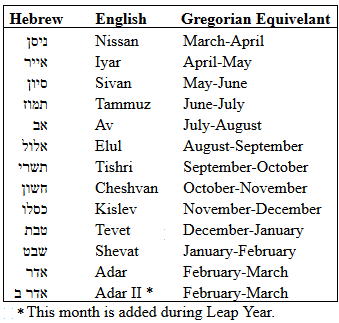What is the Hebrew word behind the word "O" as in "Hear O Israel?" Answer
Is there a difference between heaven and heavens? Is one spiritual and the other physical? Answer
How does the Hebrew word "pas" get translated as "colors" in Genesis 37:3? Answer
What is the “Paragogic Nun?” Answer
What is the Hebrew word for "alone?" Answer
Where can the word Yasha (Strong's #3467) be found in the Hebrew Bible? Answer
What does the name Eber mean in Hebrew? Answer
What are the Hebrew words for "us" and "our" in Genesis 1:26? Answer
What is the difference between the name "Jew" and the name "Hebrew"? Answer
What are the Hebrew names for the months of the year? Answer
What is the Hebrew word behind the word "O" as in "Hear O Israel?"
There is no Hebrew word behind the word "O." It is added into the translation to help the text flow better. In the Hebrew text it simply says "Hear Israel." But because this phrase could be interpreted different ways in English (Does this mean that one is to listen to Israel or that Israel is to listen?) so they inserted the word "O" to clarify the text.
Is there a difference between heaven and heavens? Is one spiritual and the other physical?
The first thing to keep in mind is that in Ancient Hebrew thought there is no separation between the physical and non-physical, they are the one and the same. An example of this is in Psalm 24:4 where "clean hands" and "pure heart" is one and the same thing. A common form of Hebrew poetry the "and" connects two phrases as one and the same thing. Clean hands are a sign of a pure hearth and visa-versa.
The heavens are the physical skies and it is also the place of God, one and the same thing. It is the western (i.e.: Greek) thinking that separates the two realms. We often see the "spirit" as spiritual and the "body" as physical but in Hebrew thought they are one and the same thing. Without the spirit (actually breath in Hebrew) the body cannot survive and with the body the spirit cannot survive.
In Hebrew the word shamayim (Strong's #8064) is in the plural (the "yim" ending is the plural suffix). This word is always written in the plural. You may see "heaven" or "heavens" in your Bible but they are both the word shamayim. There are several Hebrew words that are always written in the plural - water is mayim and face is paniym (yim and iym are both plural endings). Personally, I prefer to translate the Hebrew word shamayim as "skies". This eliminates any confusion between heaven, heavens and sky.
From an Ancient Hebrew perspective, who know nothing about gas giants which, we call the sun and stars, millions or billions of miles away called the sun or stars or the vast expanse of space. They saw the "heavens" as a "sheet" that covers the earth just like the Hebrews nomadic tent that covers the family. In fact, from the inside of a nomadic tent the cover looks just like the night sky, stars and all.
I believe the connection that the Hebrews made between God and his "host" is that they can see the "sheet" of the skies but they cannot see beyond it, neither can they see or even speculate on what is beyond that sheet. The Ancient Hebrew mind did not concern itself with things they could not see, hear, feel, smell or touch. It is Greek thinking that delves into the philosophy of the unknown. The Hebrew word "olam" is usually translated as "eternity" or "forever". This word literally means "what is beyond the horizon" or "hidden". To the Hebrews God is olam, not eternal but "unknown" or "hidden".
How does the Hebrew word "pas" get translated as "colors" in Genesis 37:3?
What many are not aware of is that about 20% of the meanings of Hebrew words in the Bible are not known. Some of them are completely unknown while the meanings of others are still obscure. Over time more and more word meanings are coming to light due to archeological discoveries. Sometimes older translations (such as the KJV) are less accurate because less is known about the words but newer translations have the advantage of recent discoveries. This is probably the case with the word pas. Originally it was guessed that this word meant diverse or many colors. But know it is known that this word has something to do with the palm and in this context probably means a "long sleeved" garment, which would be an uncommon and special garment at that time.
What is the “Paragogic Nun?”
Hebrew verbs can have a variety of prefixes and/or suffixes added to the verb root. For instance, when the letter ת (tav) is added to the front of the verb דבר (D.B.R, Strong's #1696), the conjugated verb תדבר (tedaber), meaning “you (masculine singular) speak,” is formed. When the letter ו (vav) is then added to the end of this verb, it becomes תדברו (tedaberu), meaning “you (masculine plural) speak.” On rare occasions one will find the letter ן (nun) added to the end of a verb conjugation, such as in תדברון (tedaberun). This additional letter is called the “paragogic nun” and adds the idea of “must” or “certainly” to the verb. So while תדברו (tedaberu) means “you will speak,” תדברון (tedaberun) means “you must speak.”
What is the Hebrew word for "alone?"
The base word is בד (bahd/vahd) meaning a “stick.” The ל (le) is a prefix meaning “to” and the ו (o) is a suffix meaning “his.” So לבדו means “to his stick.” A stick is a piece of a tree that is separated from the tree. The phrase “to his stick” is a Hebrew idiom meaning to be “alone.”
Where can the word Yasha (Strong's #3467) be found in the Hebrew Bible?
Yasha is not exactly a Hebrew word; it is a root (ישע / yasha, Strong's #3467 – to save) from which verbs are derived from. This is a common mistake made by people who do not know anything about Hebrew and use Strong's Dictionary to determine what Hebrew words lay behind the English translations.
For instance, in Exodus 14:30 we read, "The LORD saved Israel." The word "saved" is identified as Strong's #3467 and Strong's Dictionary states that this is the Hebrew verb ישע (yasha, Strong's #3467). But in reality, the word in the text is יושע (yosha), which is the hiphil form of this verb and identifies the subject of the verb as "third person, masculine, singular" and would be literally translated as "he caused to be saved."
If you look up the word "savior" in the Bible, such as in Isaiah 45:15, this word will also be identified as Strong's #3467 - yasha. But in reality, it is the Hebrew word מושע (moshi'a), which is the hiphil participle form of the verb and would literally be translated as "one who causes to save."
When it comes to verbs, Strong's Dictionary will only provide the root, it does not provide the different conjugations used in the Bible. While Strong's is an excellent resource, its limitations need to be understood in order to use it efficiently.
With all of this said, the Hebrew root word ישע (Y.Sh.Ah), in all of its different conjugations, does appear 205 times in the Hebrew Bible.
What does the name Eber mean in Hebrew?
The name Eber is first found in Genesis 10:21 - Unto Shem also, the father of all the children of Eber… (KJV)
In Hebrew this name is written as עבר (ever, Strong's #5677) and is derived from the verb עבר (Ah.B.R, Strong's 5674), which means "to cross over" or "to pass through." The noun derived from this verb is עבר (ever, Strong's #5676) and means "the other side" and this is also the meaning of the name Eber.
A person that is descended from Eber is called an עברי (eevriy - Hebrew), which literally means "one of Eber." A group of people descended from Eber are called עברים (eevriym – Hebrews).
What are the Hebrew words for "us" and "our" in Genesis 1:26?
In Hebrew, most pronouns (such as "us" and "our") are written as prefixes or suffixes. Such is the case with Genesis 1:26. In this verse is the Hebrew verb נעשה (na'a'sah), which is the Hebrew verb עשה (asah) meaning "to make." The prefix נ (na) identifies the subject of the verb as first person plural (us) -- "we will make" or "let us make." Also in this verse is the noun בצלמנו (b'stalmeynu), which is the noun צלם (tselem) meaning "image." The prefixed letter ב (b) means "in" -- "in the image." The suffix נו (nu) means "our" -- "in our image." The reason you are having trouble finding these pronouns is that Strong's dictionary and other lexicons only identify the "base" word and not the prefixes and suffixes attached to them.
What is the difference between the name "Jew" and the name "Hebrew"?
The name "jew" is pronounced "yehudiy" in Hebrew and means "from the family of Judah". The first occurrence of the name "Jew" is in the book of esther. Judah was one of the 12 sons of Jacob and anyone descended from Judah was a Yehudiy. The nation of Israel split into two nations, Judah (consisting of descendents of Judah, Benjamin and some Levites) in the south and Israel (consisting of the other 10 tribes) in the north. Those living in Judah became known as Yehudiy. When the northern tribes of Israel were taken into Assyrian captivity, all that remained was Judah, the yehudiym (the Jews). The "Jews" were then taken into Babylonian captivity and later returned to the land of Israel but still called the yehudiym as they are known by to this day.
The name Hebrew is of unknown origin but many, myself included, believe that is a reference to the descendents of "Eber" which would include Abraham, Isaac and Jacob and his sons. Therefore, by definition the Jews are Hebrews (descended from Jacob) as well as Jews (from the nation of Judah).
What are the Hebrew names for the months of the year?
The following is a chart of the names of the Hebrew calendar used today.

Only three of these names are used in the Hebrew Bible-Nissan (Nehemiah 2:1, Esther 3:7), Elul (Nehemiah 6:15) and Adar (Ezra 6:15, Esther 3:7, 13, 8:12, 9:1,5,17,19,21). Tammuz is mentioned in the Hebrew Bible, not as a name of a month, but the name of the Babylonian deity (Ezekiel 8:14). This brings up an interesting question. Why is the name of a foreign god in the Hebrew calendar? The names of each month, identified in the chart above, were introduced during Judah's captivity in Babylon. This is evidenced in the fact that the three names mentioned in the Hebrew Bible are in books written during, or after, the Babylonian captivity. Prior to the Babylonian captivity, the name of each month was identified by its cardinal number. For instance, the first month (known as Nissan) was originally called "the first month" as seen in Exodus 12:2.
This month shall be unto you the beginning of months: it shall be the first month of the year to you.



